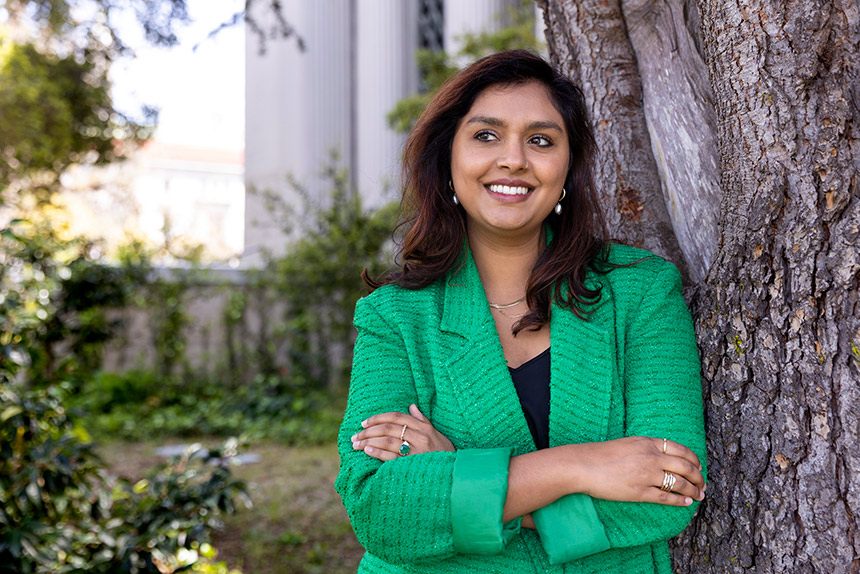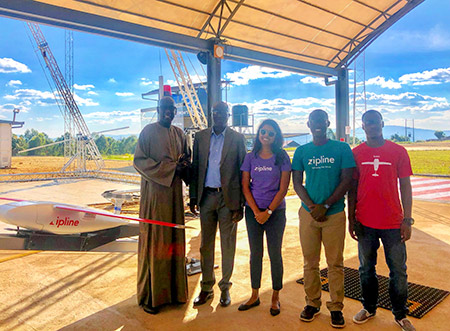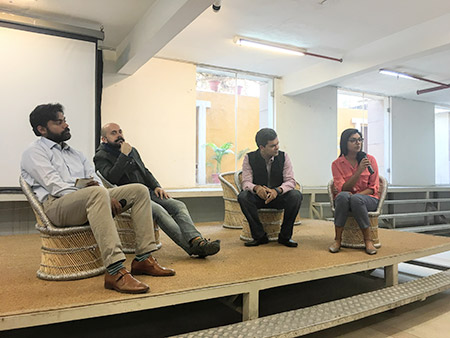
By Andrew Cohen
A mixed platter of impulsiveness, foresight, and courage continues to serve rising 3L Devanshi Patel-Martin well.
In law school — the latest stop on her globe-trotting tour — it helped launch a new student organization: Mass Media at Berkeley Law. After meeting classmates and fellow journalists Nicole Antonuccio (former art director at The Onion) and Caroline Lester (award-winning writer and audio producer) last year, common ground sparked a common goal.
“We wanted to bridge the gap between law and media, foster community among law students interested in media, and promote education and awareness about its legal challenges and implications in today’s society,” says Patel-Martin, former managing editor of a media tech company (The Juggernaut) that covers South Asia. “We also wanted to bolster career development and exploration.”
For Patel-Martin, diving into a new endeavor sparked by creative curiosity was nothing new. In 2016, she left a plum job at the software company Box and “made a life-changing decision” to move to India. Venture capital and angel investments were surging there, enabling startups to secure funding and fueling India’s startup boom.
“I decided that living in India was the priority and the job would come later,” Patel-Martin says. “I had a burning desire to be at the forefront of innovation, work with like-minded individuals, and immerse myself in a country brimming with entrepreneurial energy.”
She joined a new investment firm, Investopad, and became its head of portfolio growth. Eager to encourage women entrepreneurs, she also wrote about that effort for a major Indian tech blog.
“The vibrant ecosystem, supportive government policies, and entrepreneurial spirit of India’s youth made it an ideal destination for aspiring entrepreneurs,” Patel-Martin says. “I was fortunate to witness firsthand the incredible growth and transformation of the Indian startup landscape.”
Broadening her reach
Her work opened new opportunities focused on “doing good with tech.” She went in-house at Cuemath, an education startup that received major funding from Google to set up math learning centers across India and train women who’d been out of the workforce to become after-school math teachers.

With American tech companies increasingly eager to set up business internationally, Patel-Martin then joined Zipline, which facilitated last-mile delivery of blood and vaccine products in hard to reach places by drone. The company moved her to Nairobi, where she set up government partnerships across sub-Saharan Africa and spent time living and negotiating deals in Kenya, Ethiopia, Ghana, Côte d’Ivoire, Senegal, Zimbabwe, and Indonesia.
Patel-Martin also developed a newsletter covering tech and social enterprise in other markets, illuminating issues such as 2016’s massive demonetization within India currency — then overshadowed by the U.S. presidential election that occurred on the same day.
“After leaving Zipline, on another whim, I moved to San Miguel de Allende, Mexico because I was reporting on a story there and took some time to study for the LSAT and apply to law school,” she says. “I wound up meeting my now-husband and staying 2½ years in Mexico, before our family moved to Berkeley.”
As The Juggernaut’s managing editor, Patel-Martin worked with hundreds of journalists and edited stories on topics ranging from misinformation about COVID-19 and Whatsapp to Nigeria’s love of Bollywood. She also did an in-depth investigation of the global debate around vaccine patents at the height of India’s 2021 COVID surge, reported on factors driving Hindu nationalism in the Indian American diaspora, and wrote a story that went viral about South Asian mothers’ affinity for Princess Diana.
“My goal was always to find the right voice to tell the story,” she says. “Working as a journalist outside the U.S. also let me see firsthand the challenges to press freedom that are emerging in other countries, and now in the U.S. as well.”
A deep summer dive
Interested in where the First Amendment and the internet meet, Patel-Martin is working this summer in Wilson Sonsini’s internet strategy and litigation practice group.

“It’s one of the only practices in the country that works on the specific areas of law that I’m interested in,” she says. “I loved Civil Procedure and Conflict of Laws with Professor [Andrew] Bradt, and enjoy applying those principles in the litigation work I’m doing now and hope to do in the future.”
Professor Jonathan D. Glater, Mass Media at Berkeley Law’s faculty adviser, is working to expand course offerings for students interested in the law-media nexus and will teach a new Law in Media course this fall.
After graduating, Patel-Martin will clerk for Hawaii Supreme Court Justice Sabrina McKenna. She hopes to continue writing for non-legal audiences, whether as a freelance writer or through academic research, tackling the problems of disinformation and access to the courts.
“My journalistic background has armed me with the skills to scrutinize information, separate fact from fiction, and understand the dynamics of media landscapes,” she says. “The intersection of law and media is where I see my future. I’m committed to helping create a world where media remains a trustworthy source of information, journalists and their newsgathering rights are protected, and internet platforms are better incentivized to create safe online spaces.”